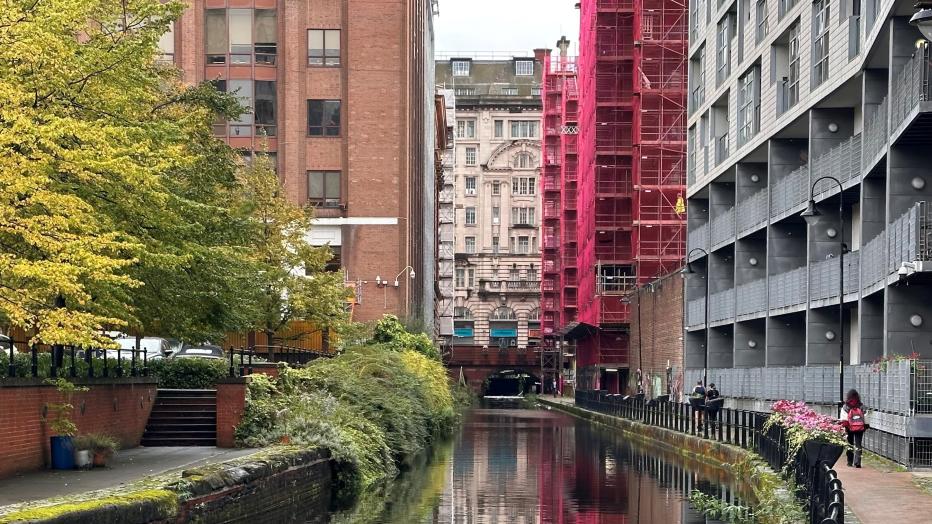
The challenge was complex: Greater Manchester is a vast region with unique water supply issues, environmental considerations, social challenges and economic aspirations that one organization can’t manage. It required a market-leading collaboration between the Greater Manchester Combined Authority, the Environment Agency and United Utilities, the regional water supplier. This led to the first city-region Integrated Water Management Plan (IWMP) in England. The result: the IWMP offers a step change in water improvement and environmental impact and an industry blueprint for how water should be managed at scale.
The Greater Manchester Combined Authority has a long history of taking a whole system approach to social, economic and environmental issues. This approach confronts the root causes of issues — rather than symptoms — by strengthening collective power through the active collaboration of diverse people and organizations to transform structures, customs, mindsets, power dynamics and policies. This collaboration is rooted in shared goals to achieve lasting improvement to solve social problems at a local, national and global level.
This collaborative mindset led to the creation of the Trilateral Partnership between the three organizations. This partnership provides a new integrated approach that leverages existing partnerships to address major water environment challenges, including climate change, population growth and urbanization. With a track record of working in partnership with our clients, a multi-sectoral presence in the North West and a reputation as a trusted supplier, Jacobs offers a unique blend of capabilities and insight to support these ambitions.
“Jacobs’ involvement with United Utilities’ Upper Mersey Place-based Planning pilot demonstrated that multi-sector input is essential when making a step change to how water is managed. This led to the Trilateral Partnership recommending that an Integrated Water Management Plan should be developed for Greater Manchester, which gained political mandate and will see place-based planning progress at a broader scale.”
-
9
months taken to develop the Integrated Water Management Plan after receiving a mandate from the Mayor of Greater Manchester.
-
7
workstreams through which the plan will be delivered: The Integrated Opportunity Pipeline, a Digital Platform, Adaptive Policies and Standards, The Partnership, Skills and Resources, Integrated Investment Plan and Marketing and Engagement.
-
60
datasets brought together to identify opportunities for integrated delivery and added value.
-
10 K
approximate number of investment opportunities across the city-region that could either directly or indirectly benefit water management issues.
-
520
key areas identified from the datasets.
The challenge
The changing climate is affecting local and regional weather patterns. It’s placing increasing pressure on water supplies with longer periods of dry weather and rising risk of flooding. In addition, the pressures on water resources are increasing due to urban growth, population growth, higher living standards, growing competition for water and pollution aggravated by climate change.
The solution
The Greater Manchester IWMP creates a new framework for collaboratively addressing the major challenges impacting the water environment. The IWMP moves away from a siloed business-as-usual, multi-organizational delivery to a more integrated and ambitious partnership approach. With appropriate engagement and funding, this can deliver more value, wider benefits and more sustainable outcomes in the longer term.
Jacobs applied its integrated catchment management approach to manage multiple stakeholders and collaboratively identify and combine opportunities for optimized delivery. For example, 60 datasets were carefully researched and created, and from these, 520 areas were identified and prioritized by applying more than five multi-sectoral investment criteria. These key areas were then clustered in close spatial proximity to be considered for joint co-planning, design, funding and delivery. The ultimate benefits will go beyond flood protection and water quality — they include social value, biodiversity net gains and improvements to ecosystem services.
Collaboration is at the heart of an integrated water management approach. The local relationships developed by the project partners over decades of infrastructure and advisory experience enabled partnerships to be formed more easily. This creates a singular focus on catchment outcomes as opposed to organizational objectives.
Big picture
The Greater Manchester IWMP is the first of its kind at a city-region scale and takes advantage of a unique combination of a strong political mandate, integrated cross-organizational leadership and a highly competent and regionally embedded delivery team. The plan defines a new vision and ambition for integrated water management — it creates a new framework for delivery that will provide added value and wider benefits for people, places and the environment.
“It has been an incredible experience to contribute to a project that will revolutionize water management in a region where Jacobs has worked for a long time, alongside a diverse and highly-skilled team and client.”
Key team members
-

Phil Raynor, Director of Operations and Regional Market Solutions Lead, Water, Europe
Phil is actively shaping a new ‘normal’ for integrated water management and delivery in the North West of England and more widely in the U.K. by leveraging Jacobs’ technical expertise and its networks and organizational relationships.
-

Priscila Mauro, Principal Urban Designer
Priscila’s design-led, placemaking focus, strong stakeholder engagement and management skills have supported the team with integrated, holistic solutions that go beyond infrastructure provision by providing social value, resilience and a sense of place.
-

Dr. Matthew McParland, Hydromorphologist
Matthew is developing the geospatial analytical process for the IWMP project. This helps identify the most advantageous opportunities for integrating civil engineering projects and investment initiatives across Greater Manchester.
-

Dr. Chris Newton, Principal Surface Water Technologist
Chris completed the analysis of the potential alternative funding options for the IWMP, identifying opportunities for collaboration with other infrastructure projects within Greater Manchester.













































